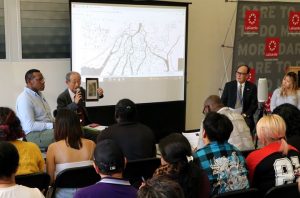Unbridgeable gap within NPT Preparatory Committee, Part 3: Young people sympathize with A-bomb survivors’ stories
May 16, 2025
Pinning hope on solidarity of cities
by Fumiyasu Miyano, Staff Writer
On the evening of April 30, two officers from the Japan Confederation of A- and H-Bomb Sufferers Organizations (Nihon Hidankyo) shared their accounts of the atomic bombing at a public university in the New York City borough of Queens, located on the opposite side of the East River from the United Nations Headquarters. Jiro Hamasumi, 79, Assistant Secretary General of Nihon Hidankyo and resident of the city of Inagi in Tokyo, experienced the atomic bombing in Hiroshima while in his mother’s womb. Holding up a picture of his father, who died in the atomic bombing before he was born, Mr. Hamasumi spoke about his suffering. “I have lived thinking I wanted to live twice as long as my father did, for his sake.”
Wanting to support efforts to convey
Last year, Nihon Hidankyo received the Nobel Peace Prize. The accounts of the survivors, who attended the award ceremony in December, held in Oslo, Norway, touched the hearts of more than 70 students of various ages and origins. Vanessa Alvis, a 29-year-old freshman, who has also lost her father, said that she felt their strength to fight against the atomic bomb and wanted to support their efforts to convey it to the world.
The visit of the two Hidankyo members to New York coincided with the Third Preparatory Committee for the 2026 Review Conference of the Parties to the Treaty on the Non-Proliferation of Nuclear Weapons (NPT) held at the United Nations Headquarters. On April 30, Hiroshi Kanamoto, an 80-year-old representative director of the organization and Nagoya resident, delivered a speech at the session he participated in as a representative of non-governmental organizations (NGOs). Sharing his experience of the Hiroshima bombing, he urged diplomatic officials from various nations: “Will the NPT continue discussions indefinitely without any progress?”
Eight high school students from Hiroshima Prefecture, who were sent by Mayors for Peace (for which Hiroshima Mayor Kazumi Matsui serves as president), were as active as the survivors while in New York. On April 29, they took part in a forum organized by Mayors for Peace and interacted with people of the same generation from various countries. Haruki Ryoda, a 17-year-old junior at Eishin High School in Fukuyama City, introduced the experience and words of a survivor of the Hiroshima bombing and said: “The movement for nuclear abolition originated with the suffering of the atomic bomb survivors.”
Revising the term “anniversary”
There was a scene where we could get a glimpse of the diplomats’ desire to be close to the appeals from the atomic bomb survivors and the A-bombed cities. On May 8, during the final phase of the sessions on the draft recommendations, a South African representative stated that the wording should be changed to reflect the passage of 80 years since the first testing and use of atomic bombs, as the bombings are not something to celebrate.
The diplomat pointed out the part of the draft that described: “the 80th anniversary … an important moment to renew the global commitment for a world free of nuclear weapons,” as the term “anniversary” could be interpreted in a positive way. Malaysia also proposed to make changes. Consequently, the language in the updated draft was changed to “80 years after the first testing and use of nuclear weapons.” The draft recommendations were not adopted after all. However, it was the development that aligned with the thoughts of the people of the A-bombed cities.
Hiroshima Governor Hidehiko Yuzaki and Hiroshima Mayor Matsui developed on-site municipal-level diplomacy, respectively, to advance the abolition of nuclear weapons, as was previously done. On April 30, Mayor Matsui and Shiro Suzuki, the mayor of Nagasaki, together met the representatives from the United States, the United Kingdom, and France. During an interview with the press corps, they openly expressed their frustration, stating nuclear-weapon states continue to blame each other, causing the nuclear disarmament process to stall.
Matsui said: “Discussions between nations often become heated, with each side blaming the other, saying, ‘We are doing our part, but you are not.’” He requested cooperation from everyone he met with, including Harold Agyeman, Permanent Representative of Ghana and Chair of the Third Preparatory Committee, and Antonio Guterres, Secretary-General of the United Nations, to encourage more local governments to join Mayors for Peace. Solidarity of atomic bomb survivors, young people, and local governments across borders will become a driving force in reversing the international situation around and moving toward a world free of nuclear weapons and war.
(Originally published on May 16, 2025)








